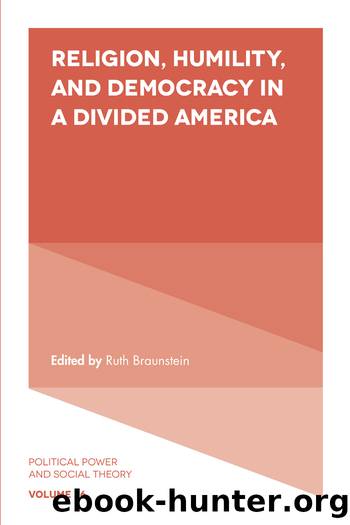Religion, Humility, and Democracy in a Divided America by Braunstein Ruth;

Author:Braunstein, Ruth;
Language: eng
Format: epub
Publisher: Emerald Publishing Limited
Published: 2019-05-23T00:00:00+00:00
Survey Data
Survey data on a series of epistemic questions asked of signatories to the Yale Response empower a nuanced evaluation of the intellectual humility they do and do not exhibit. The data were gathered through a survey instrument deployed in 2013.13 The survey was deployed via the Qualtrics tool between May and September of 2013. Survey invitations were sent to 210 signatories. Of those, 192 opened the email (91%). Of those, 114 started the survey (59%). Of those, 98 fully completed it, making for a response rate of 47%. The mean survey duration was 15 minutes and 20 seconds, covering 53 questions. The survey process sought to capture as many exclusivist responses as possible by prioritizing recruitment from evangelical and other conservative Protestant signatories. Respondents, like the evangelical signatories to the Yale Response, were overwhelmingly male (91%), white (91%), and American (93%). Respondent ages ranged from 38 to 84 with a median age of 65. In terms of education, 96% of respondents had completed postgraduate studies. The data indicate what intellectual humility looks like among this unexpected alliance for Muslim recognition.
The literature uses several main indicators to identify evangelicals. The first is self-identification.14 The second is identification with the âconservative protestantâ tradition.15 The third is some other variable or set of variables associated with evangelicalism, such as belief in the Bibleâs inerrancy or the practice of evangelism as central to faith.16 This instrument tested each of these approaches among signatories to the Yale Response. Basic statistics on self-identification as evangelical and with particular religious traditions can be found in Table 1. Table 5 provides data on self-identified evangelicalsâ diverse relationships to the Bible as a source of religious truth. All tables in the chapter represent count data. Ultimately the chapter uses self-identification as its primary selection mechanism because of the internal diversity among responding evangelicals with regard to their religious tradition and orientations toward the Bible and other traditionally evangelical beliefs. By this definition, 58 respondents self-identified as evangelicals (59%), 38 did not (38%), and three did not know whether or not they so identified (3%).17
Download
This site does not store any files on its server. We only index and link to content provided by other sites. Please contact the content providers to delete copyright contents if any and email us, we'll remove relevant links or contents immediately.
| Africa | Americas |
| Arctic & Antarctica | Asia |
| Australia & Oceania | Europe |
| Middle East | Russia |
| United States | World |
| Ancient Civilizations | Military |
| Historical Study & Educational Resources |
Cecilia; Or, Memoirs of an Heiress — Volume 1 by Fanny Burney(32544)
Cecilia; Or, Memoirs of an Heiress — Volume 2 by Fanny Burney(31941)
Cecilia; Or, Memoirs of an Heiress — Volume 3 by Fanny Burney(31928)
The Secret History by Donna Tartt(19045)
Sapiens: A Brief History of Humankind by Yuval Noah Harari(14362)
Leonardo da Vinci by Walter Isaacson(13315)
The Radium Girls by Kate Moore(12014)
Sapiens by Yuval Noah Harari(5364)
How Democracies Die by Steven Levitsky & Daniel Ziblatt(5211)
The Wind in My Hair by Masih Alinejad(5087)
Homo Deus: A Brief History of Tomorrow by Yuval Noah Harari(4905)
Endurance: Shackleton's Incredible Voyage by Alfred Lansing(4765)
Man's Search for Meaning by Viktor Frankl(4576)
The Silk Roads by Peter Frankopan(4525)
Millionaire: The Philanderer, Gambler, and Duelist Who Invented Modern Finance by Janet Gleeson(4464)
The Rape of Nanking by Iris Chang(4201)
Joan of Arc by Mary Gordon(4099)
The Motorcycle Diaries by Ernesto Che Guevara(4089)
Stalin by Stephen Kotkin(3956)
